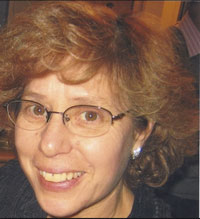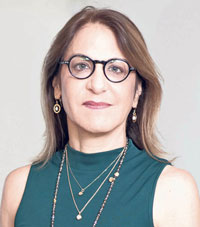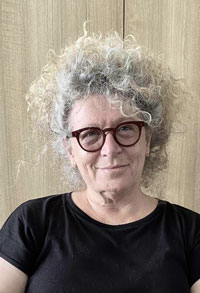Colloquium Committee
In touch with what at times seems like darkness and chaos in our world, the Colloquium Committee decided, as a sequel to our May colloquium on Freud’s “Why War,” to grapple with the issue of hatred. Following Sue Grand’s (USA) generous acceptance of our invitation, the community, together with our marvelous panel, Sandra Buechler (USA), Victor Donas (Chile), Thembelihle Dube (South Africa), Rajan Gupta (New Zealand), Brendan McPhillips (Australia), Jill Salberg (USA), Dan Shaw (USA) and Chana Ullman (Israel), discussed her paper, “On Hatred: Perpetrator Fragments and Totalitarian Objects.”

Sue Grand
The discussion was rich with a natural flow of emotion, content and exchange, with the participants sharing heartfelt experiences and difficult thoughts, formulating important questions. A serious attempt was made to break down hate’s meaning, to describe it, associate it with different feelings and observe it across contexts. Is hate primary or secondary? Is it the result of envy, powerlessness, existential threat, fear, exclusion, insult, rejection? Is it social conditions? Capitalism or lack of resources? Or is it a pure emotion that manifests differently when associated with these other states of mind and self? And what about the love-dependency-hate connection?
Additional questions emerged. How attached we are to being of the “good” sort, and is this in itself a form of splitting and othering? Do we need hate? Can it be utilized? Channeled? Is it a crucial element in activism? In political resistance? Does it embolden us, or eat our soul away? Are we forever victims of our persecutory history or is there a way to re-externalize the toxicity of our internalized perpetrator fragments and eliminate hatred of others and self? Moving among our childhood homes, misogynistic and racist experiences, cult abuse, wars and political and economic ideologies, we discussed the malignancy that is at times involved, blocking the transformation of hatred to constructive action and activism. Some mentioned feeling emboldened and enlivened by hate, while others felt hate gnaws at us, leaving us bereft. Grappling with hatred was at times difficult, deadening, and we were struck by the frequent use of outer resources (poetry and art).
One truth emerged clearly. It is not new, but it is good to recall and formulate the basics. It is always this thing with the Other. It begins with the most personal of dangers. Borrowing some sentences from a beautiful “hate and love” post: “It is about hating that others can hurt us so much, and in so many ways: by withholding their love of me; by directing their anger at me; by hating me just like I hate them. By talking to me when I want silence; by not responding when I talk to them; by forcing me out of myself; by not forcing me out of myself.” And, continuing, by insulting me, by taking my resources, threatening my livelihood and existence, trampling my rights, having or taking what I don’t have, in the present and the past, in reality or in our imaginations.
And another truth — we have better chances with (inevitable) hate, it seems, if we keep a reflective distance from it even when it emboldens and enlivens us, if we can contain it until we figure how to express it in ways that will allow us later to continue existing with ourselves and with our Others. If we don’t stop loving.
So, as someone wrote succinctly, accurately: maybe this is a beginning.
We are deeply grateful for the wealth of this discussion, the respect and generosity shared by its participants.
Until May,
Cathy and Shlomit
Cathy Hicks (Australia) and Shlomit Gadot (Israel)
Colloquium Committee Co-Chairs
Cathy Hicks, Ph.D.
Sydney, Australia
Email Cathy Hicks

Shlomit Gadot, Ph.D.
Ramat Hasharon, Israel
Email Shlomit Gadot


